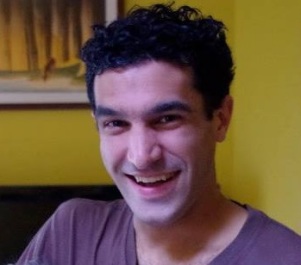
“Placenta” by Ned Thimmayya is a magnificently grisly story from our very bloody Summer 2015 issue, which is available here, here, here, or here.
{ X }
HANNAH SAT IN THE WAITING ROOM, spring green walls and stacks of magazines her only– very cold–company.
In her mind, she carried her stillborn nephew, eyes squeezed to cracks, hands tiny and untried, the umbilical cord vascular blue and looped three times around the child’s neck, tight as spool and thread. They surgically removed the placenta minutes after they extracted the lifeless blunder-of-joy.
The procedure to remove the placenta was necessitated by a placenta percreta. The placenta had embedded itself in the uterine wall and–by virtue of its dazzling, opportunistic veins–had penetrated to the bladder. There the placenta’s long fingers threatened to violate the mother’s internal organs. The doctor said he’d never seen such an invasive case.
{ X }
“Who didn’t cut the umbilical?” he yelled, arriving at the scene of the stillbirth and snapping everyone’s own private colloquy with the situation. His words were a show; the child had died in the early stages of labor.
According to him, one such accident constituted heartache for all involved. A series of stillbirths in his ward translated to lifelong professional consequences and personal guilt. An entire year of frequent stillbirths, occurring beyond the hospital and even across international boundaries, formed the salient health question of his time. Since it was this last and most prominent challenge that he faced, there was no shame in his individual ignorance. His sense of helplessness in the path of death, however, could not be softened by the unanswered questions posed in peer-reviewed journals and obstetricians’ conferences. Fatal compressions of the nuchal cord–an umbilical cord characterized by at least one full loop around the baby’s neck–had once been so rare. Which drugs had come into fashion since the trend? Were there alterations in birth practices that coincided with the upsurge of fatalities?
{ X }
Hannah’s sister had never been in great danger. She lay on her back, her chest rising and falling in waves that slowly dissipated as the son fell ever further out of the world he so briefly shared with his mother.
Hannah watched the television in the waiting room. The news anchor talked, but she did not hear his words. Would her nephew have had such bad luck if he’d made it outside the womb? Turning and twisting to kill himself on his lifeline. And this umbilical cord. Why should it play the role of executioner when it was preordained to be the giver of life? What moved the child to entangle himself so?
Hannah held up a hand between her eyes and the news anchor, partially to block him from sight, partially to look at her hand. What granted her the opportunity to see it more than a stubby knob and to remember the motions it had made, the curiosities held, the people touched? Fortune or fate? Fortune more than fate. Chance most of all.
{ X }
The downcast nurse was sunken cheeked, her lips riven by the sucking of countless cigarettes. She carried the bloody placenta in a translucent bag, rhubarb bulge deepening to black behind the plastic.
She thought she might go to the movies that night. Maybe with the dirty-looking boy who worked down at the hardware store. She planned to shed her bloody scrubs, hop in her car, and drive home fast, running the red light (as always), slowing down in front of the municipal parking lot just long enough to let her ex and his friends recognize her. It was a dry summer, so she’d really be able to kick the dust up at them when she stepped on the gas.
She’d put on her crimson dress before she met up with the hardware boy. And she planned to be harsh that night, disdainful. How dare he wait so long to fuck her? Time was running out.
Her mother said that this was the generation of revolution. Her grandmother had said so too. Still the nurse watched the placentas die and wondered if they would ever enjoy life outside the womb.
Yet she watched the doctor’s faith in his professional judgment fail a little more each day. He would never believe her explanation for the stillbirths. She didn’t want him to believe her. She could run it by the hardware boy that night, not because she doubted herself, but because she wanted to convince others some day. She needed to learn how to explain it.
The nurse knew the value of identity. It was the one thing they had in this humdrum town. He was the boy with bad posture, always a two-by-four over his shoulder, and a tool-belt too big for him and dragging his pants down almost to the knees. Her ex was the guy with the boxy chest who tottered around the municipal parking lot, looked you in the eye when he talked to you, was too noble to tell a lie even when it was stupid not to lie. She was the girl in the Pontiac who peeled out in front of the municipal parking lot. A nurse in the maternity ward was what others called her. A woman who favored the placenta was how she privately saw herself. She was part of the special generation.
An identity was something they all had and something no one could take away from them. They had it so much better than the placentas, which were tossed into the incinerator at their first glimpse of daylight.
{ X }
They found out what happened to the nurse–or most of what happened–because there was a security camera near the exit door in the hospital’s basement. The nurse falling on her back and into the camera’s domain. The umbilical, having made several circuits around the nurse’s neck, smoothly loosening itself and reforming as a chain sheathed in skin. The tapered end, dragging violet-colored pus, marching straight down the woman’s body, bending a U at her waist, and gliding beneath her hospital coat until it found its way to her navel.
There it fastened and ceased to move until once, twice, at an ever more frequent rate, oval modules passed along its length like bumps on a swallowing python. In the security video, her coat rose and fell with each bump like her stomach had its own set of lungs. After it had its fill, the umbilical freed itself and pursued a linear course to the basement elevator. Disgorged food dripped down the side of the nurse’s belly. The umbilical’s long promenade revealed the significant extension afforded it by the nurse’s nutritious stuffing.
The placenta itself had by now swollen to the size of a basketball. It was not so adept at rolling across the floor and thus relied on the umbilical to tug it along. The vascular system ever expanded its inscrutable network of vessels over the surface, trapping the blood-drenched tissue in a pale blue net, each beat of some hidden organ celebrating the placenta’s vitality by sprinkling red confetti over the basement’s gum-splotched floor. This throbbing mass pulled across the nurse, painting a red smear from her ankles to her face. A loose placental vein momentarily hitched the nurse’s nostril, but the umbilical bunched and flexed to free itself and the inconvenience was forgotten. Knob after knob of veiny tube slid into the elevator and out of sight. The nurse gaped through the placenta’s red signature.
{ X }
We all die, thought Hannah as she listlessly pored over the magazine covers. It doesn’t matter whether you’re good or bad. Her nephew and sister had done no wrong.
The placenta, pulled by the umbilical, lurched past the room of its birth and would’ve passed directly through its mother’s field of vision had she been awake. It never hesitated in its advance down the main hall of the maternity ward. As it progressed with mechanical purpose, the umbilical wrapped, tugged, and released objects. An IV stand or a doorway was the only leverage it needed to put a few more tiles behind it. The mother lay with her head tilted to the side, face ashen, sweat evaporated, content mouth indicating sleep had taken her to some temporary refuge.
Further down the hall, in the waiting room, Hannah leafed through her magazine and read her thoughts in its pages.
There were always going to be complications because of that over-grown placenta. The doctor had told them to prepare for the worst. You never know how things will turn out. She’d learned that placentas are stubborn things. They have specialized cells to repress and survive the onslaught of the mother’s immune system. The placenta must battle for a place in the womb. It’s only an accessory. When its use is spent, it’s cast aside or studied. Shouldn’t it be natural that living cells sink deep into the body that hosts them? And natural that once introduced, they do not willingly depart? Some cultures believe the placenta is a friend of the baby or even a twin. In Nigeria, they eat the placenta. To consume it or make it disappear, wondered Hannah.
Her mother had told her all of this. Yes, back when Hannah was ten–or was it eleven?–Hannah’s mother had told her a folktale about births gone awry because of placentas. Hannah couldn’t remember the exact story, but there was a forward-looking ingredient which was a warning against pregnancy in some future “zero” year. Maybe her mother’s warning still breathed beneath Hannah’s more recently acquired maturity and logic. It was so much easier to blame the reluctance of a partner or commitment to her career. Why, inside her, was she certain that these reasons were just excuses?
Having traversed the length of Hannah’s torso undetected, the umbilical emerged from the neck of her blouse. Without touching her skin, it began winding its spiral around her throat. Only when the throbbing chain tightened did Hannah raise her tried and tested hands to fight for her own small life.
{ X }
 NED THIMMAYYA lives in Brooklyn, New York. His fiction has appeared in Slice Magazine, Five Quarterly, and Lacuna. His legal scholarship has appeared in the Brooklyn Journal of International Law and the Pace Environmental Law Review. He occasionally maintains a blog on environmental law called Courts, Cats, and Carbon.
NED THIMMAYYA lives in Brooklyn, New York. His fiction has appeared in Slice Magazine, Five Quarterly, and Lacuna. His legal scholarship has appeared in the Brooklyn Journal of International Law and the Pace Environmental Law Review. He occasionally maintains a blog on environmental law called Courts, Cats, and Carbon.